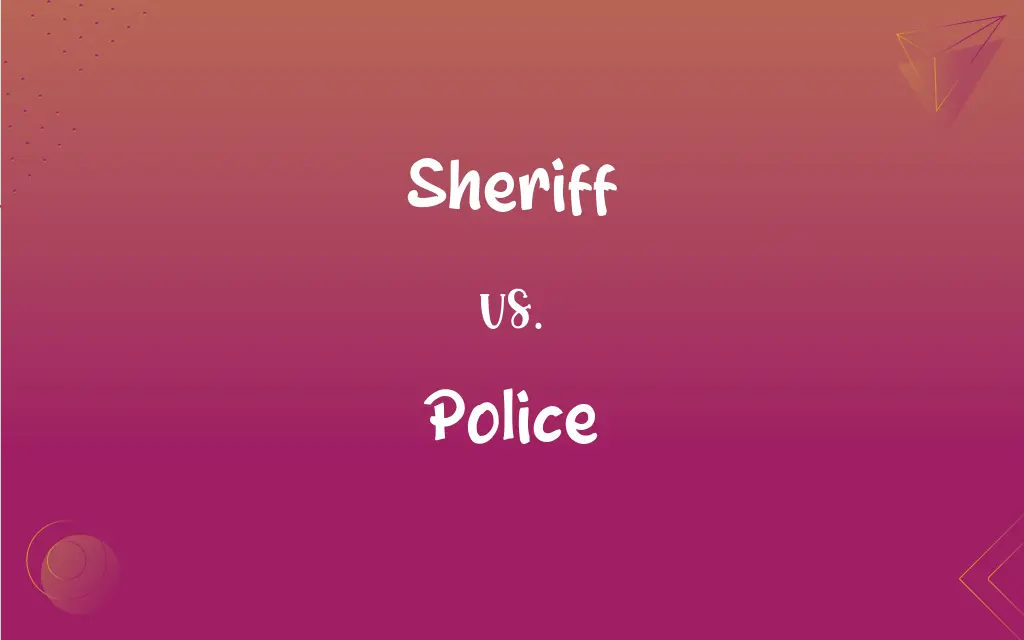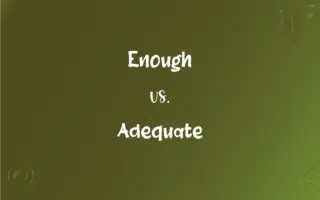Sheriff vs. Police: What's the Difference?
Edited by Harlon Moss || By Janet White || Published on December 14, 2023
Sheriffs are elected officials overseeing a county, often with broader legal authority; police are municipal law enforcement officers serving cities or towns.

Key Differences
The sheriff is typically responsible for a county, which can include multiple towns and rural areas. In contrast, police officers operate within specific city or town limits, enforcing laws in that particular municipality.
Sheriffs often have a wider range of duties, including operating county jails, serving warrants, and court security, while police focus more on urban law enforcement, traffic control, and community policing.
Sheriffs are usually elected officials, which means they answer directly to the electorate of their county. Police officers, on the other hand, are appointed by a city or town government and are part of a structured police department hierarchy.
Both sheriffs and police are essential for maintaining law and order, but sheriffs may have more authority in certain legal matters, like evictions, than city police. Police departments, however, often have specialized units like SWAT or narcotics that may not be present in sheriff's departments.
Sheriffs, due to their elected position, may engage differently with their community, focusing on broader county issues, whereas police officers often engage in community policing, addressing city-specific concerns.
ADVERTISEMENT
Comparison Chart
Jurisdiction
County-wide
City/Town-specific
Election/Appointment
Elected
Appointed
Main Responsibilities
Law enforcement, jail management, court duties
Urban law enforcement, traffic control, community policing
Organizational Structure
County Sheriff's Department
City Police Department
Community Relationship
Directly accountable to electorate
Structured interaction through city governance
ADVERTISEMENT
Sheriff and Police Definitions
Sheriff
Sheriff, a chief law enforcement officer in a county.
The sheriff announced a new crime prevention initiative.
Police
Police, officers enforcing laws within a city.
The police patrolled the downtown area.
Sheriff
Sheriff, an elected position overseeing county law enforcement.
The newly elected sheriff vowed to improve public safety.
Police
Police, conducting investigations into city crimes.
The police detective solved the burglary case.
Sheriff
Sheriff, responsible for managing county jails.
The sheriff inspected the county jail facilities.
Police
Police, part of a city's law enforcement department.
The police department launched a community outreach program.
Sheriff
Sheriff, possessing broad legal powers in their jurisdiction.
The sheriff served eviction notices as part of their duties.
Police
Police, responsible for enforcing traffic laws.
The police issued citations for speeding.
Sheriff
Sheriff, a key figure in county-wide public safety.
The sheriff coordinated with other agencies during the emergency.
Police
Police, involved in maintaining public order and safety.
The police interacted with local residents at a community event.
Sheriff
A public officer in the United States with responsibility for certain law enforcement and administrative legal duties, such as making arrests and serving processes, usually for a particular county.
Police
A body of government employees trained in methods of law enforcement and crime prevention and detection and authorized to maintain the peace, safety, and order of the community.
Sheriff
A public officer in various other countries performing certain law enforcement, judicial, or ceremonial functions.
Police
A body of persons with a similar organization and function
Campus police. Also called police force.
Sheriff
(High Sheriff) An official of a shire or county office, responsible for carrying out court orders, law enforcement and other duties.
Police
(Archaic) Regulation and control of the affairs of a community, especially with respect to maintenance of order, law, health, morals, safety, and other matters affecting the public welfare.
Sheriff
(Scotland) A judge in the sheriff court, the court of a county or sheriffdom.
Sheriff
(US) A government official, usually responsible for law enforcement in their county and for administration of the county jail, sometimes an officer of the court, usually elected.
Sheriff
To carry out the duties of a sheriff
Sheriff
The chief officer of a shire or county, to whom is intrusted the execution of the laws, the serving of judicial writs and processes, and the preservation of the peace.
Sheriff
The principal law-enforcement officer in a county
FAQs
What's the primary jurisdiction of a sheriff?
County-wide jurisdiction.
Can a sheriff enforce laws in cities?
Yes, within their county jurisdiction.
How is a sheriff appointed?
Sheriffs are elected by county residents.
Do sheriffs run jails?
Yes, they often manage county jails.
How do sheriffs interact with local police?
They collaborate on law enforcement across jurisdictions.
What's the role of a sheriff in court security?
Providing security and serving legal documents.
Are sheriffs part of the police department?
No, they lead separate sheriff's departments.
How are police officers appointed?
They are appointed by city governments.
Can police officers issue warrants?
They can request, but judges issue warrants.
What's the community role of police officers?
Engaging in community relations and safety programs.
What is the jurisdiction of police?
Within specific city or town limits.
Are police officers involved in community policing?
Yes, it's a key part of their role.
What's the role of police in traffic control?
They enforce traffic laws and ensure road safety.
Do sheriffs have a role in elections?
No, they are participants, not organizers.
What's the difference in training between sheriffs and police?
Both receive law enforcement training, but specific duties may differ.
Are police involved in criminal investigations?
Yes, particularly for city-based crimes.
Do police officers have specialized units?
Yes, like SWAT or narcotics.
Do police handle emergency response?
Yes, especially within city limits.
Can police operate outside their city?
Generally, their authority is city-specific.
Can sheriffs make arrests?
Yes, within their jurisdiction.
About Author
Written by
Janet WhiteJanet White has been an esteemed writer and blogger for Difference Wiki. Holding a Master's degree in Science and Medical Journalism from the prestigious Boston University, she has consistently demonstrated her expertise and passion for her field. When she's not immersed in her work, Janet relishes her time exercising, delving into a good book, and cherishing moments with friends and family.
Edited by
Harlon MossHarlon is a seasoned quality moderator and accomplished content writer for Difference Wiki. An alumnus of the prestigious University of California, he earned his degree in Computer Science. Leveraging his academic background, Harlon brings a meticulous and informed perspective to his work, ensuring content accuracy and excellence.
































































